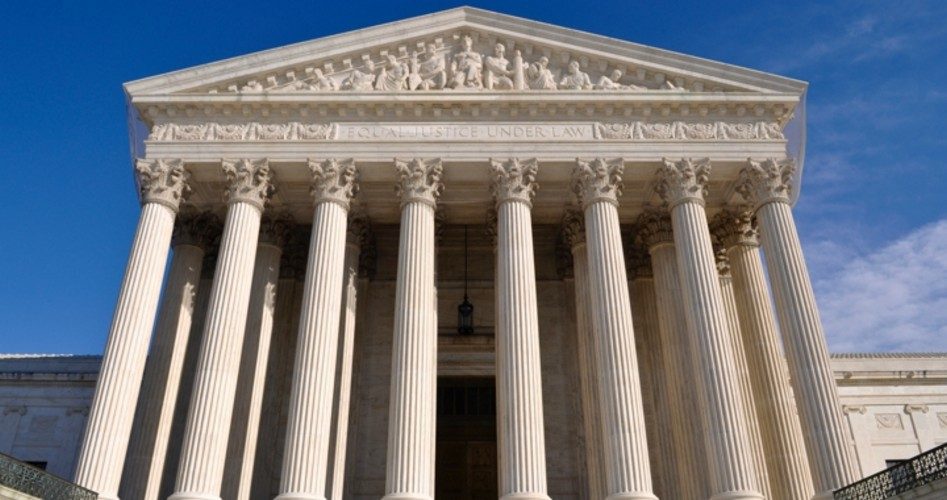
Podcast: Play in new window | Download ()
Subscribe: Android | RSS | More
Calling it the most important case of the year, the Wall Street Journal urged the Supreme Court to declare the Consumer Financial Protection Bureau (CFPB) unconstitutional. The justices began hearing arguments on the matter on Tuesday morning.
The agency, the brainchild of Senator Elizabeth Warren (D-Mass.), was specifically and intentionally designed not only to be independent of Congress and the president but also to gather unto itself all three separate powers inimical to the U.S. Constitution: law-maker, judge, and enforcer. To make matters worse, the agency is funded by the Federal Reserve rather than Congress, thus avoiding Congressional oversight. It resides in the Eccles Building, which also houses the Fed, and is run by a single dictator who cannot be fired except for cause.
The agency was included in Dodd-Frank, the bill Congress passed following the 2008 financial crisis. It immediately began harassing legitimate businesses by issuing rules and then finding companies that violated them. Once found, they would be threatened with outrageous fines.
One of its victims, a sole practitioner law firm that specializes in consumer lending, received a demand that it turn over its records in order to determine if it had violated certain telemarketing rules the agency had written. The owner, Aissac Aiono, refused. The head of the agency pressed the matter. Aiono sued, claiming that the agency, and its titular head, was unconstitutional since it violated the separation of powers doctrine inherent in the U.S. Constitution.
That case, Seila Law v. CFPB, is now being heard by the Supreme Court.
The New American exposed the CFPB in June 2018 when its acting director, Mick Mulvaney, culled the agency’s board of directors by firing all 25 of them. Mulvaney, a Trump appointee, called the agency a “sad, sick joke” and “essentially a one-person dictatorship.” There is no congressional oversight on its activities, it writes its own laws, it investigates any violations of those laws and then fines those who have violated them. In simple terms, Warren’s brainchild is, as it was designed to be, a rogue agency.
Aiono, with the help of a number of other attorneys, crafted the brief, noting in particular that the president can’t fire the head of the agency except for “inefficiency, neglect of duty, or malfeasance in office.”
When a panel of the U.S. Court of Appeals for the District of Columbia Circuit ruled in 2016 that the structure of the CFPB was unconstitutional, then-Judge Brett Kavanaugh wrote: “When measured in terms of unilateral power, the Director of the CFPB is the single most powerful official in the entire U.S. Government, other than the President. Indeed, within his jurisdiction, the Director of the CFPB can be considered even more powerful than the President.”
Kavanaugh added that “independent agencies collectively constitute, in effect, a headless fourth branch of the U.S. government. Because of their massive power and the absence of Presidential supervision and direction, independent agencies pose a significant threat to individual liberty and to the constitutional system of separation of powers and checks and balances.”
The Court has three options. It may simply rule that the agency’s demand for documents from Aiono’s law firm is invalid and unenforceable. It may eliminate the “for cause” provision from the law, thus allowing the president to fire the director “at will” instead.
Or, the Court can declare the entire agency unconstitutional, invalidating the entire statute that created the agency.
The Journal is recommending the third option: “Tossing the whole law would invalidate all CFPB actions to date,” including its demand for documents from Aiono’s law firm. After all, wrote the Journal in its editorial, “the Court also did this when it overturned Barack Obama’s illegal recess appointments [in 2014].… If the current Court is serious about reviving the original meaning of the separation of powers, the CFPB is an ideal opportunity to send a shot heard ’round Washington.”
It will also present an “ideal opportunity” for now-Supreme Court Justice Brett Kavanaugh to apply the same thinking he did in 2016 to the present case and declare that the rogue agency is unconstitutional. If he can persuade a majority of justices to agree, then perhaps this “shot heard ’round Washington” might be the opening round in the war to restore the Constitution to its rightful place as the supreme law of the land. Once this specific cancer is excised, then other agencies could be subjected to the same analysis and conclusion.
An Ivy League graduate and former investment advisor, Bob is a regular contributor to The New American, writing primarily on economics and politics. He can be reached at [email protected].
Related articles:
Trump Supreme Court Nominee Brett Kavanaugh Relies Heavily on Judicial Precedents
Mulvaney Drains Part of the Swamp by Firing 25 CFPB Board Members

